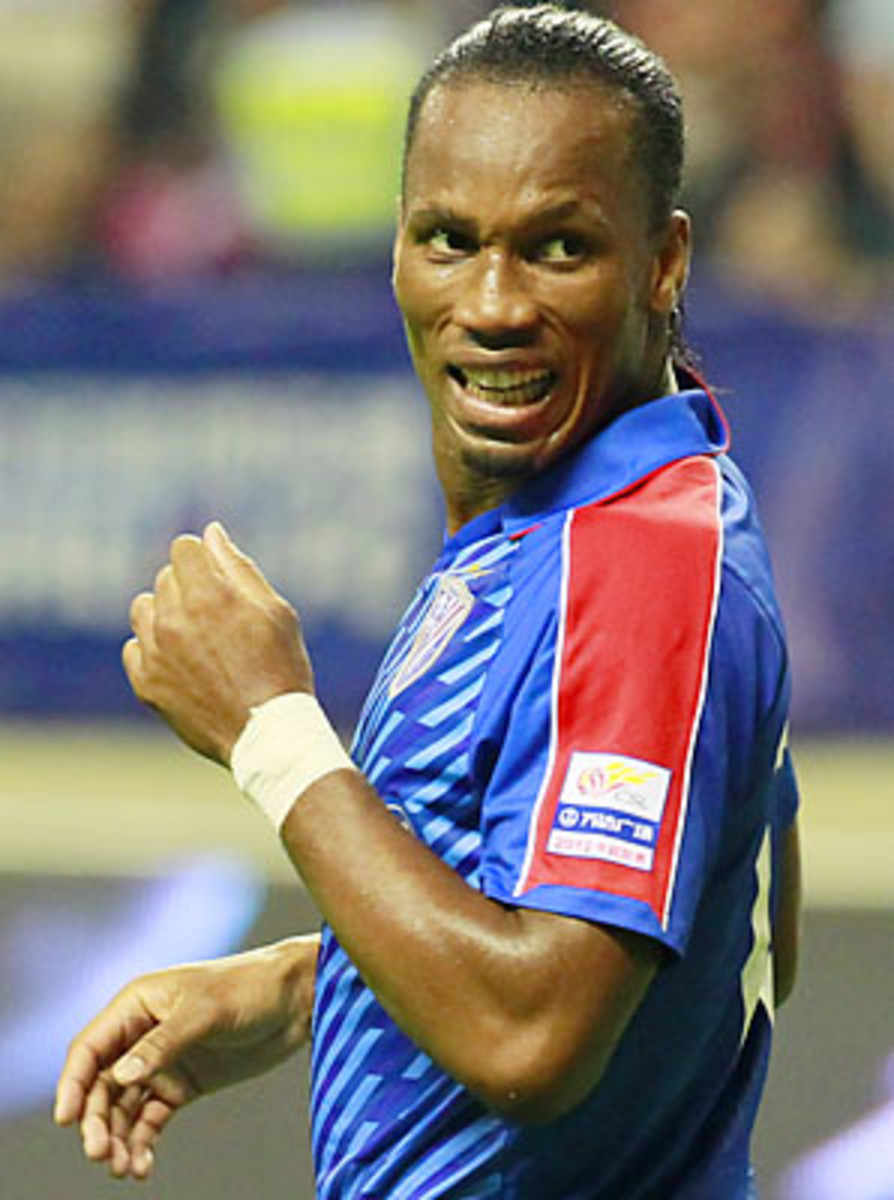New year brings new goals, perhaps new club for Drogba
Timing a retirement is hard enough for anybody; for sportspeople, used to the rush of victory and the adulation of the crowd, to the routine of training and a preposterous income, and facing perhaps 60 years of post-playing life, it must seem almost impossibly daunting.
In terms purely of narrative, Didier Drogba probably should have gone in May after the Champions League final. It seemed the perfect ending. He had been at the club eight years, and had been striving all that time for European glory. He'd been sent off in the 2008 Champions League final and banned for the ferocity of his protests after Chelsea had lost to Barcelona in the 2009 semifinal. Munich was his redemption. He headed the 88th-minute equaliszr and then rolled in the final penalty.
It was Drogba, as much as any individual, who was the inspiration behind that Champions League success, which felt, even as it was going on, as though a bunch of senior players had decided enough was enough and they were going to win the thing no matter what: it was a trophy won by willpower. He had led the line tirelessly in the two legs of the semifinal against Barcelona, scoring the crucial goal in the match at Stamford Bridge with what was pretty much his only chance. His last kick in a Chelsea shirt was the kick that sealed the title, as though the previous eight years had all been building to that moment.
That was the perfect time to bid farewell to Chelsea, as Drogba realized; there was nothing left to achieve. He might, perhaps, have considered quitting football for good -- although, having not started playing regularly at professional level until he was 21, he is a young 34 -- but he had unfinished business with Ivory Coast as well as with Chelsea.
Drogba is the senior player and captain of what is generally regarded as the greatest generation of Ivorian players. With the likes of the Toure brothers, Emmanuel Eboue, Didier Zokora, Salomon Kalou and Gervinho, this is one of the greatest groups any African nation has ever produced. It qualified for the World Cups in 2006 and 2010 and both times was drawn in hideously difficult groups (with Argentina, the Netherlands and Serbia-Montenegro in 2006 and with Brazil, Portugal and North Korea in 2010). First-round exits were unfortunate but explicable.
Far less explicable is Ivory Coast's ongoing failure to repeat its Cup of Nations triumph of 1992. In 2006, it lost in the final on penalties to host Egypt. In 2008, it lost 4-1 to Egypt in the semifinals, Amr Zaki giving Kolo Toure a runaround from which he never seems quite to have recovered. In 2010, it conceded an equalizer in the final minute of a quarterfinal against Algeria and disintegrated in extra time. And in January, it lost on penalties in the final again, this time to Zambia.
With the tournament moving to odd-numbered years and another finals beginning in South Africa next month, it's hardly surprising that Drogba should be desperate for one last chance -- particularly given the level of personal responsibility he must feel. He has been a superb captain, statesman-like in orange even when he was at his most petulant in blue, always encouraging younger players. Never losing his rag -- not even with when Gervinho misplaced another simple pass, always calming flashpoints. But he also missed a sitter late in the 2006 final before failing from the penalty spot, and then missed a penalty after 70 minutes against Zambia in Libreville this year.
Would Drogba have retired altogether in May if Ivory Coast had won in Libreville? Perhaps not, but the temptation would have been far greater. And if South Africa is his prime target, all Drogba had to do after leaving Chelsea was find a club where he could play at a level decent enough to retain sharpness -- preferably while making a reasonable wage. Shanghai Shenhua seemed to offer that opportunity but, with rumors of unpaid wages from the start, that did not work out.
Now Drogba is seeking a contract back in Europe and, intriguingly, seems insistent on a two-year contract, taking him to 2014, the same term as his Shenhua contract, which suggests he may be eyeing the World Cup in Brazil as his swansong (although it only drew in Morocco, Ivory Coast is atop its qualifying group). He had been in talks with Juventus, in clear need of a striker, but those seem to have broken down on the basis that the club was willingly only to offer a six-month loan deal.
"Transfer talk seems disrespectful to the players in my team, especially at the current moment," Juventus manager Antonio Conte said. "It's a critical time as far as the economy is concerned and it's the same for several other teams. We won't be signing any top players because we're not in a position to. Neither us, nor other top teams in the Italian league."
That rather cuts down Drogba's options. He has been training with Chelsea -- and it could desperately do with a backup for Fernando Torres -- but at this stage there seems little desire on either his part or that of the club to return to the situation of a year ago. If Chelsea fails to land its preferred targets in January, of course, that could change, and it's possible that if better offers aren't forthcoming, Drogba may reconsider a loan move.
But for now, Drogba has two goals in January: the first is to win the Cup of Nations and tick another item off his to-do list. The second is to find a club to keep him going for the World Cup.






